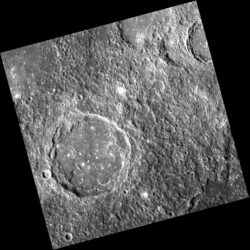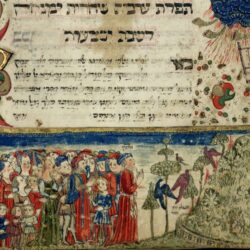| Source (Hebrew) | Translation (English) |
|---|---|
עֵת שַׁעֲרֵי רָצוֹן לְהִפָּתֵחַ יוֹם אֶהְיֶה כַפַּי לְאֵל שׁוֹטֵחַ אָנָּא זְכֹר נָא לִי בְּיוֹם הוֹכֵחַ עוֹקֵד וְהַנֶּעְקָד וְהַמִּזְבֵּחַ |
[It is the] time for the gates of acceptance to be opened, The day I shall be with prostrate palms before God. Please, remember for me on the day of rebuke — [Recall] the binder, the bound, and the altar. |
בָּאַחֲרִית נֻסָּה בְּסוֹף הַעְשָׂרָה הַבֵּן אֲשֶׁר נוֹלַד לְךָ מִשָּׂרָה אִם נַפְשְׁךָ בוֹ עַד מְאֹד נִקְשָׁרָה קוּם הַעֲלֵהוּ לִי לְעוֹלָה בָרָה עַל הַר אֲשֶׁר כָּבוֹד לְךָ זוֹרֵחַ עוֹקֵד וְהַנֶּעְקָד וְהַמִּזְבֵּחַ |
In the end [Abraham] was tested, at the end of the ten [tests]: “The son which was born to you from Sarah — If your soul is exceedingly tied tight with him, Arise, and raise him up as a pure burnt offering On a mountain [where God’s] glory shines out to you.” [Recall] the binder, the bound, and the altar. |
אָמַר לְשָׂרָה כִּי חֲמוּדֵךְ יִצְחָק גָּדַל וְלֹא לָמַד עֲבוֹדַת שַׁחַק אֵלֵךְ וְאוֹרֵהוּ אֲשֶׁר לוֹ אֵל חַָק אָמְרָה לְכָה אָדוֹן אֲבָל אַל תִּרְחַק עָנָהּ יְהִי לִבֵּךְ בְּאֵל בּוֹטֵח עוֹקֵד וְהַנֶּעְקָד וְהַמִּזְבֵּחַ |
[Abraham] said to Sarah, “For your dear Isaac Has grown, but has not learned the worship of Heaven, I will go and teach him that he has a God who rules.” She said, “Go, lord, but do not go far.” He answered her, “Let your heart trust in God.” [Recall] the binder, the bound, and the altar. |
שַָׁחַר וְהִשְׁכִּים לַהֲלֹךְ בַּבֹּקֶר וּשְׁנֵי נְעָרָיו מִמְּתֵי הַשֶּׁקֶר יוֹם הַשְּׁלִישִׁי נָגְעוּ אֶל חֵקֶר וַיַּרְא דְּמוּת כָּבוֹד וְהוֹד וָיֶקֶר עָמַד וְהִתְבּוֹנֵָן לְהִמָּשֵׁחַ עוֹקֵד וְהַנֶּעְקָד וְהַמִּזְבֵּחַ |
Dawn broke, and he awoke early to walk in the morning, with his two young men of the deceitful people. On the third day, they reached the point of investigation, And he saw an image of glory, majesty and honor. He stood and meditated on his anointing. [Recall] the binder, the bound, and the altar. |
יָדְעוּ נְעָרָיו כִּי קְרָאָם לֵאמֹר אוֹר הַרְאִיתֶם צָץ בְּרֹאשׁ הַר הַמֹּר וַיֹּאמְרוּ לֹא נֶחֱזֶה רַק מַהְמוֹר עָנָה שְׁבוּ פֹה עַם מְשׁוּלִים לַחֲמוֹר וַאֲנִי וְהַנַּעַר לְהִשְׁתַּטֵּחַ עוֹקֵד וְהַנֶּעְקָד וְהַמִּזְבֵּחַ |
His young men knew, when he called them, saying, “Did you see light, glittering at the top of the Mountain of Myrrh?” And they said, “We see nothing but a pothole.” He answered, “Sit here, people compared to the donkey, And I and the young man [will go] to prostrate ourselves.” [Recall] the binder, the bound, and the altar |
הָלְכוּ שְׁנֵיהֶם לַעֲשׂוֹת בִּמְלָאכָה וְיַעֲנֶה יִצְחָק לְאָבִיו כָּכָה אָבִי רְאֵה אֵשׁ וַעֲצֵי מַעֲרָכָה אַיֵּה אֲדֹנִי שֶׂה אֲשֶׁר כַּהֲלָכָה הַאַתְּ בְּיוֹם זֶה דָּתְךָ שׁוֹכֵחַ עוֹקֵד וְהַנֶּעְקָד וְהַמִּזְבֵּחַ |
The two of them went to do their job, And Isaac answered his father so: “Father, see the fire and the firewood; But where, sir, is the necessary sheep? Could you have forgotten on this day your law?” [Recall] the binder, the bound, and the altar. |
וְיַעֲנֶה אָבִיו בְּאֵל חַי מַחְסֶה כִּי הוּא אֲשֶׁר יִרְאֶה לְעוֹלָה הַשֶּׂה דַּע כָּל אֲשֶׁר יַחְפֹּץ אֱלֹהִים יַעֲשֶׂה נִבְנֶה בְנִי הַיּוֹם לְפָנָיו כִּסֵּא אָז יַאֲמִיר זֶבַח וְהַזּוֹבֵחַ עוֹקֵד וְהַנֶּעְקָד וְהַמִּזְבֵּחַ |
And then his father answered, “By the Living and Sheltering God, Gd will Himself, see the sheep for the burnt offering; Know that everything that God desires, He will do. We will build, son, a throne before Him today — Then He will designate the sacrifice and the slaughterer.” [Recall] the binder, the bound, and the altar. |
דָּפְקוּ בְּשַׁעְרֵי רַחֲמִים לִפְתֹּחַ הַבֵּן לְהִזָּבַח וְאָב לִזְבֹּחַ קֹוִים לְָאֵל וּבְרַחֲמָיו לִבְטֹחַ וְקֹוֵי ה׳ יַחֲלִיפוּ כֹחַ דָּרְשׁוּ בְּנַחְלַת אֵל לְהִסְתַּפֵּחַ עוֹקֵד וְהַנֶּעְקָד וְהַמִּזְבֵּחַ |
They knocked on the gates of mercy to open — The son to be sacrificed, and the father to sacrifice [him] — Hoping to God, and trusting in His mercy, And those who hope in Hashem will renew their strength. They sought to become attached to God’s homestead. [Recall] the binder, the bound, and the altar. |
הֵכִין עֲצֵי עוֹלָה בְּאוֹן וָחַיִל וַיַּעֲקֹד יִצְחָק כַּעַָקְדוֹ אַיִל וַיְהִי מְאוֹר יוֹמָם בְּעֵינָם לַיִל וַהֲמוֹן דְּמָעָיו נוֹזְלִים בְּחַיִל עַיִן בְּמַר בּוֹכָה וְלֵב שָׂמֵחַ עוֹקֵד וְהַנֶּעְקָד וְהַמִּזְבֵּחַ |
He prepared the wood for the offering with power and strength, and then he bound Isaac as he would bind a ram; And the light of days was night in their eyes, And multitudes of tears were flowing in strength. The eye was crying bitterly, but the heart was happy. [Recall] the binder, the bound, and the altar. |
שִׂיחוּ לְאִמִּי כִּי שְׂשׂוֹנָהּ פָּנָה הַבֵּן אֲשֶׁר יָלְדָה לְתִשְׁעִים שָׁנָה הָיָה לְאֵשׁ וּלְמַאֲכֶלֶת מָנָה אָנָה אֲבַקֵּשׁ לָהּ מְנַחֵם אָנָה צַר לִי לְאֵם תִּבְכֶּה וְתִתְיַפֵּחַ עוֹקֵד וְהַנֶּעְקָד וְהַמִּזְבֵּחַ |
“Tell my mother that her joy has turned away — The son she gave birth to at ninety years of age Has gone to the fire, and been designated for the knife. Where will I find a comforter for her, where? It pains me for my mother to cry and sob.” [Recall] the binder, the bound, and the altar. |
מִמַּאֲכֶלֶת יֶהֱמֶה מִדְבָּרִי נָא חַדְּדָהּ אָבִי וְאֶת מַאְסָרִי חַזֵּק וְעֵת יְֵקַד יְקוֹד בִּבְשָׂרִי קַח עִמְּךָ הַנִּשְׁאָר מֵאֲפְרִי וְאְמֹר לְשָׂרָה זֶה לְיִצְחָק רֵיחַ עוֹקֵד וְהַנֶּעְקָד וְהַמִּזְבֵּחַ |
”My wilderness will reel in shock from the knife — Please sharpen it, father, and my bonds Strengthen, and burn the fire in my flesh; Take with you that which remains from my ashes, And tell Sarah ‘This is Isaac’s perfume’.” [Recall] the binder, the bound, and the altar. |
וְיֶהֱמוּ כָּל מַלְאֲכֵי מֶרְכָּבָה אוֹפַן וְשָׂרַָף שׁוֹאֲלִים בִּנְדָבָה מִתְחַנְּנִים לָאֵל בְּעַד שַׂר צָבָא אָנָּא תְּנָה פִדְיוֹם וְכֹפֶר הָבָה אַל נָא יְהִי עוֹלָם בְּלִי יָרֵחַ עוֹקֵד וְהַנֶּעְקָד וְהַמִּזְבֵּחַ |
And then all the angels of the chariot were shocked — Wheels and Seraphs asking for a boon, Begging God as their General, “Please, grant redemption, and give a ransom; Do not let the world be without its moon!” [Recall] the binder, the bound, and the altar. |
אָמַר לְאַבְרָהָם אֲדוֹן שָׁמַיִם אַל תִּשְׁלְחָה יָד אֶל שְׁלִישׁ אוֹּרַיִם שׁוּבוּ לְשָׁלוֹם מַלְאֲכֵי מַחְנַיִם יוֹם זֶה זְכוּת לִבְנֵי יְרוּשָׁלַיִם בּוֹ שַׁעֲרֵי רַחֲמִים אֲנִי פּוֹתֵחַ עוֹקֵד וְהַנֶּעְקָד וְהַמִּזְבֵּחַ |
The Lord of the Heavens said to Abraham, “Do not stretch your hand out to one third of two lights”. [And to the angels,] “Return in peace, angels of the two camps — This day is a merit for the children of Jerusalem; On it I open the gates of mercy!” [Recall] the binder, and the bound, and the altar. |
לִבְרִיתְךָ שׁוֹכֵן זְבוּל וּשְׁבֻעָה זָכְרָה לְעֵדָה סוֹעֲרָה וּנְגוּעָה וּשְׁמַע תְּקִיעָה תּוֹקְעָה וּתְרוּעָה וֶאֱמֹר לְצִיּוֹן בָּא זְמַן הַיְשׁוּעָה יִנּוֹן וְאֵלִיָּה אֲנִי שׁוֹלֵחַ עוֹקֵד וְהַנֶּעְקָד וְהַמִּזְבֵּחַ |
For your covenant, Dweller On High, and the oath, Remember for the storm-tossed and afflicted congregation! And hear the sounds calls [of the shofar], And say to Ẓion, “The time of rescue has arrived! I am sending the messiah and Elijah!” [Recall] the binder, the bound, and the altar. |
This is the piyyut, עֵת שַׁעֲרֵי רָצוֹן (Eit Shaarei Ratson) by Rabbi Yehuda ben Shmuel ibn Abbas (12th century Aleppo, Syria (born in Fez, Morocco)) traditionally sung prior to the blowing of the shofar in nusaḥ of Sefaradi, Mizraḥi, and Maghrebi Jews. Rabbi David de Sola Pool, in the introduction to his maḥzor for Rosh haShanah, writes: “The call of the Shofar adds its clamant appeal to that of the human voice. The stern and weird tones of this instrument of primitive simplicity are a summons to judgment. It conjures up for ever anew the moment upon Mount Sinai when the law of life, Israel’s Torah, was given to the sound of the Shofar. Reminiscent and symbolic of the ram substituted by God for the sacrifice of Isaac, the Shofar pleads for the merit of the patriarchs to sway the balance of judgment in favor of their children — a thought movingly expressed in the hymn Et shaare ratson “Judgment gates of favor” (pages 219 to 223) by Judah Samuel Abbas.”
The English translation presented here is by Rabbi Stephen Belsky. (Thank you!)
Source(s)

Recordings
Odeleya Berlin:
Guy ZuArtez:

“עֵת שַׁעֲרֵי רָצוֹן | Eit Shaarei Ratson, a piyyut by Rabbi Yehuda ben Shmuel ibn Abbas (ca. 12th c.)” is shared through the Open Siddur Project with a Creative Commons Attribution-ShareAlike 4.0 International copyleft license.








Leave a Reply